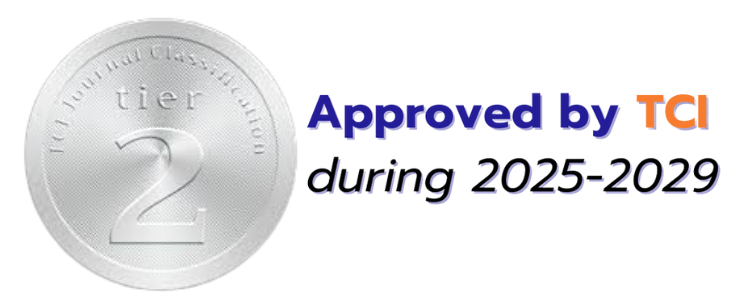การศึกษากรอบความคิดเติบโตของครูที่สอนวิทยาศาสตร์ ให้กับนักเรียนด้อยเปรียบ
##plugins.pubIds.doi.readerDisplayName##:
https://doi.org/10.56825/jehds.2025.916066คำสำคัญ:
กรอบความคิดเติบโต, ครูวิทยาศาสตร์, นักเรียนด้อยเปรียบ, โรงเรียนขนาดเล็กบทคัดย่อ
การวิจัยครั้งนี้มีวัตถุประสงค์เพื่อสำรวจกรอบความคิดเติบโตของครูที่สอนวิทยาศาสตร์ให้กับนักเรียนด้อยเปรียบ กลุ่มที่ศึกษาคือ ครูที่สอนวิทยาศาสตร์ ในโรงเรียนขนาดเล็กและเป็นโรงเรียนในชนบท สังกัดสำนักงานเขตพื้นที่การศึกษาประถมศึกษานครศรีธรรมราชเขต 2 จำนวน 40 คน จาก 40 โรงเรียนขนาดเล็กในชนบท อ้างอิงข้อมูลจากฐานข้อมูลโรงเรียนของเขตพื้นที่การศึกษา โดยมีเครื่องมือที่ใช้ในงานวิจัย ได้แก่ แบบวัดกรอบความคิดเติบโตและแบบสัมภาษณ์กรอบความคิดเติบโต วิเคราะห์ข้อมูลโดยการหา ร้อยละ ความถี่ ค่าเฉลี่ย ส่วนเบี่ยงเบนมาตรฐาน และการวิเคราะห์เนื้อหา ผลการวิจัยพบว่า ครูที่สอนวิทยาศาสตร์ ในโรงเรียนขนาดเล็กและเป็นโรงเรียนในชนบท สังกัดสำนักงานเขตพื้นที่การศึกษาประถมศึกษานครศรีธรรมราชเขต 2 มีกรอบความคิดเติบโตในภาพรวมอยู่ในระดับสูง และเมื่อพิจารณาข้อมูลจากการให้สัมภาษณ์ของครูที่สอนวิทยาศาสตร์ที่มีคะแนนกรอบความคิดเติบโตสูง ใน 10 อันดับแรกที่ยินยอมให้สัมภาษณ์ เพื่อให้เห็นถึงลักษณะการมีกรอบความคิดเติบโตที่ชัดขึ้นในมิติของความเชื่อในการพัฒนาความสามารถและความพยายามเมื่อเจอปัญหาหรืออุปสรรค พบว่า ถึงแม้จะมีกรอบความคิดเติบโตอยู่ในระดับสูงขึ้นไปทุกคน แต่จากการสัมภาษณ์นั้นพบประเด็นที่แสดงออกถึงความแตกต่างในลักษณะของการมีกรอบความคิดเติบโต โดยผู้วิจัยจัดกลุ่มครูที่ให้สัมภาษณ์ตามลักษณะบทสัมภาษณ์ออกเป็น 4 กลุ่ม คือ กลุ่ม 1 กลุ่มที่สื่อสารให้เห็นลักษณะของการมีกรอบความคิดเติบโตได้อย่างเด่นชัดมาก กลุ่ม 2 กลุ่มที่สื่อสารให้เห็นลักษณะของการมีกรอบความคิดเติบโตเด่นชัดปานกลาง กลุ่ม 3 กลุ่มที่สื่อสารให้เห็นลักษณะของการมีกรอบความคิดเติบโตไม่เด่นชัด และกลุ่ม 4 กลุ่มที่สื่อสารให้เห็นลักษณะของการมีกรอบความคิดเติบโตที่กำลังลดน้อยลง
##plugins.generic.usageStats.downloads##
เอกสารอ้างอิง
Bedford, S. (2017). Growth mindset and motivation: a study into secondary school science learning. Research papers in education, 32(4), 424-443. https://doi.org/10.1080/02671522.2017.1318809
Blackwell, L. S., Trzesniewski, K. H., & Dweck, C. S. (2007). Implicit theories of intelligence predict achievement across an adolescent transition: A longitudinal study and an intervention. Child development, 78(1), 246-263.
Dweck, C. S. (2006). Mindset: The new psychology of success. Random House.
Esparza, J., Shumow, L., & Schmidt, J. A. (2014). Growth Mindset of Gifted Seventh Grade Students in Science. NCSSSMST Journal, 19(1), 6-13.
Gouëdard, P. (2021). Sky's the Limit: Growth Mindset, Students, and Schools in PISA. PISA 2018. OECD Publishing.
IPST Thailand. (2022). Growth mindset in thai students: results from PISA 2018 assessment. The Institute for the Promotion of Teaching Science and Technology (IPST).
NCYA Thailand. (2019). Innovative thinking for child and youth development in 2019. Department of Children and Youth.
OECD. (2019). PISA 2018 Results (Volume III): What School Life Means for Students’ Lives. OECD Publishing. https://doi.org/10.1787/acd78851-en.
Plaks, J. E., Stroessner, S. J., Dweck, C. S., & Sherman, J. W. (2001). Person theories and attention allocation: preferences for stereotypic versus counterstereotypic information. Journal of personality and social psychology, 80(6), 876–893. https://doi.org/10.1037/0022-3514.80.6.876
Rissanen, I., Kuusisto, E., & Kuusisto, A. (2016). Developing teachers' intercultural sensitivity: Case study on a pilot course in Finnish teacher education. Teaching and Teacher Education, 59, 446-456. https://doi.org/10.1016/j.tate.2016.07.018.
Schmidt, J. A., & Shumow, L. (2020). Testing a mindset intervention as a resilience factor among Latino/a students in science. Journal of Latinos and Education, 19(1), 76-92. https://doi.org/10.1080/15348431.2018.1478295
Schmidt, J. A., Shumow, L., & Kackar-Cam, H. (2015). Exploring teacher effects for mindset intervention outcomes in seventh-grade science classes. Middle Grades Research Journal, 10(2), 17-32.
Sookawong, C. (2023). Growth Mindset: The Growth Mindset is The Heart of The New Generation of Student Teachers. Academic Journal of Mahamakut Buddhist University Roi Et Campus Vol, 12(1), 571-583. [translated]
Strosher, H. L. W. (2003). Prospective and Practicing Teachers' Beliefs: A Study of Implicit Theories of Intelligence and Teacher Efficacy (Master’s thesis, University of Victoria).
Tan, D., & Maeda, Y. (2021). Perceptions of science teachers’ growth-mindset practices and U.S. high school students’ initial science identity and its development. International Journal of Science Education, 43(13), 2206-2225. https://doi.org/10.1080/09500693.2021.1958021
Wisessathorn, M., Saetang, P., Paimpuech, R., & Sarobrass, C. (2022). The Development of Growth Mindset Test for Coding Teachers. Journal of Education and Innovation, 24(2), 232-247. [translated]
Yeager, D. S., & Dweck, C. S. (2012). Mindsets that promote resilience: When students believe that personal characteristics can be developed. Educational psychologist, 47(4), 302-314.
ดาวน์โหลด
เผยแพร่แล้ว
ฉบับ
บท
การอนุญาต
ลิขสิทธิ์ (c) 2025 วารสารศาสตร์การศึกษาและการพัฒนามนุษย์

This work is licensed under a Creative Commons Attribution-NonCommercial-NoDerivatives 4.0 International License.







